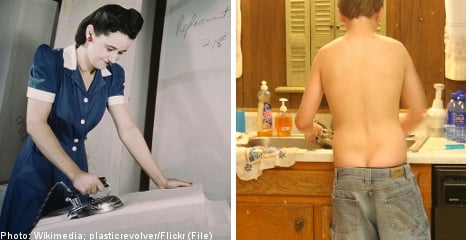Women spent an average of 14 minutes less per day on unpaid housework in 2010 than in 2000.
Men meanwhile increase their input by 11 minutes, according to Statistics Sweden (SCB) new “time use” survey.
In comparison to SCB’s time use survey from 1990, women in Sweden in 2010 spend an average of one hour less on unpaid work in the home. The input of men has meanwhile remained largely constant over time.
The report however shows that a gender imbalance remains, with women spending an extra 45 minutes on unpaid housework than their menfolk, and dedicating an average of four hours per day to the home.
Traditional gender roles have been cited as one explanatory factor for the continued gap and according to 39-year-old father-of-two Shane Quinn, the solution to the problem is to have an open dialogue.
“Divide it up. areas of responsibility. Talk. Try to focus on things that you don’t mind doing and avoid the things that drive you crazy,” he told The Local on Wednesday.
Women are instead devoting more time to their work, with an increase of 21 minutes over the decade. Men are meanwhile spending an average of 14 minutes less per day on the job.
The report indicates that despite the disparity when it comes to housework, women and men now spend an equal amount of time at work – some 7 hours and 20 minutes.
The survey also indicates that women and men spend their times pursuing different tasks in the home. Women spend almost two hours per day on housework, while men spend one, supplementing their time with 45 minutes of maintenance work.
Women spend an average of 43 minutes on cooking, while men spend 26. Washing dishes and clothes, and cleaning, occupies women for 111 minutes, while men spend an average 60 minutes.
The introduction of a tax deduction for household services (RUT-avdrag) introduced in 2007 was mooted as an initiative to ease the load of working families and also to encourage companies working in the sector to pay their taxes.
39-year-old Stockholm resident Mark Blake told The Local that while the tax break has been popular and perhaps contributed to greater equality, the business of dividing housework in the home should remain a private matter.
“It is the government’s role to ensure that taxes are paid on products and services. If there is a spin off effect and if greater equality in the home is a result, then that is just great,” he told The Local.
The survey furthermore indicates that considerable changes have occurred in how spare time is used after jobs and housework are completed.
Television continues to dominate, and has increased somewhat for both sexes. The use of the internet has also increased dramatically.
Statistics Sweden’s time use survey involved 3,294 people aged 15-84-years-old who were asked to fill out two diaries for how they spend their time on a weekday and on a weekend.


 Please whitelist us to continue reading.
Please whitelist us to continue reading.
Member comments